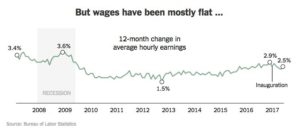It increasingly appears that the economics of the Internet tend toward the monopolization of certain distinct online niches. There is one dominant search engine (Google), one dominant social networking site (Facebook), one dominant online encyclopedia (Wikipedia), and one dominant online retailer (Amazon).
Bloomberg View economics columnist Noah Smith recently wrote an article entitled “Monopolies Are Worse Than We Thought.” In it, he contends that “There’s now evidence that market concentration could . . . be hurting workers, by decreasing the share of national income that they receive. It’s probably making inequality worse.”
U.S. public policy has traditionally disapproved of monopolies. However, after the Clinton Administration’s mostly unsuccessful attempt to break up Microsoft, there have been few recent administrations that have aggressively prosecuted alleged antitrust violations within the tech sector.
Furthermore, according to Josh Barro of Business Insider, “with the possible exception of Google, these firms are so far from meeting traditional definitions of anti-trust violations that very novel enforcement definitions would have to be developed to restrict them.”
That’s the dilemma that an ambitious young law student named Lina Khan attempted to address in her article in the influential Yale Law Journal. According to Steven Pearlstein of The Washington Post, she “laid out with remarkable clarity and sophistication why American antitrust law has evolved to the point that it is no longer equipped to deal with tech giants such as Amazon.com.”
Continue reading Will There Be a Digital-Age Revival of Antitrust Enforcement?
